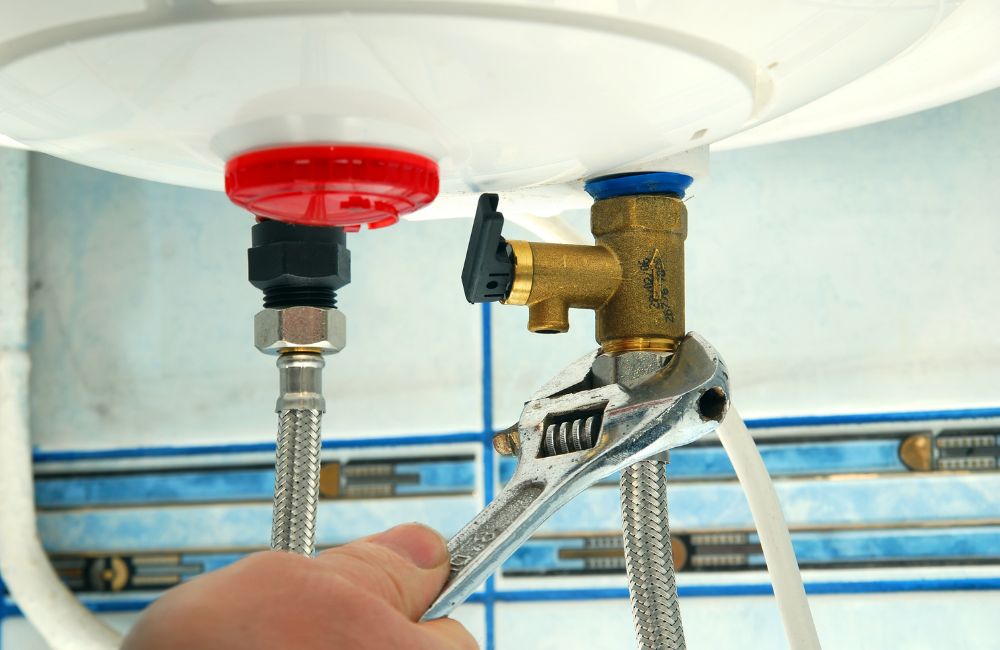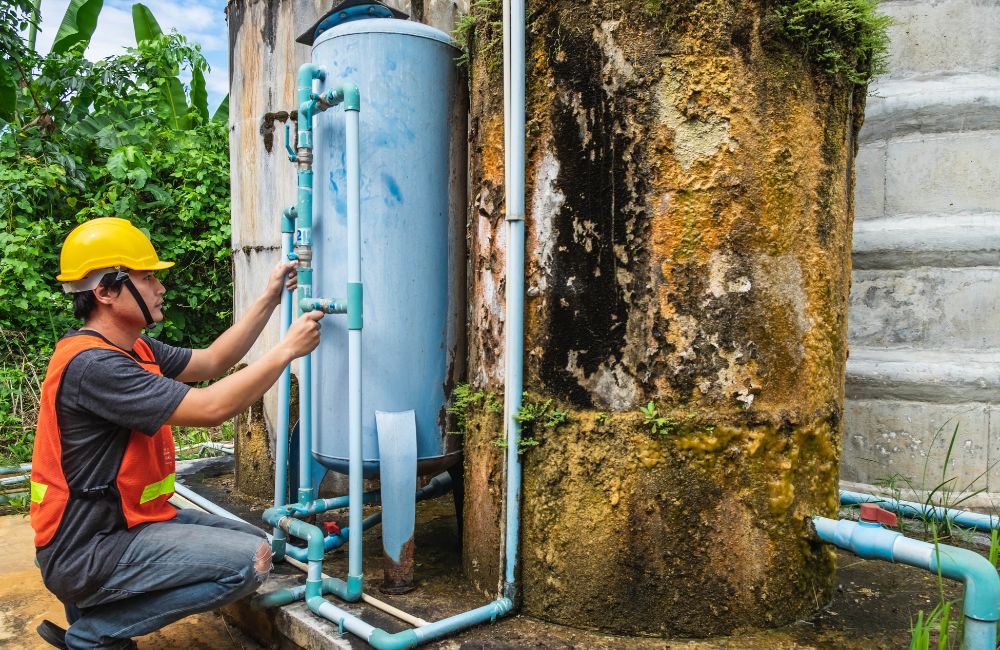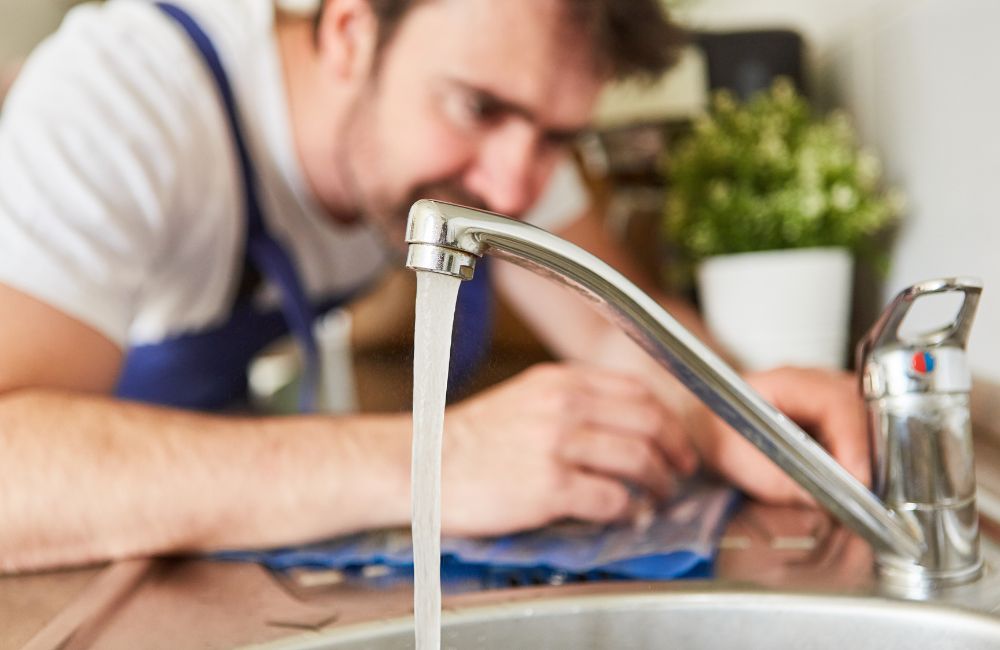Hard water, filled with minerals like calcium and magnesium, can lead to significant problems within plumbing systems, causing scale buildup, reduced water flow, and premature wear on appliances. Over time, these minerals accumulate in pipes, water heaters, and fixtures, diminishing efficiency and increasing energy costs. With the right plumber service, however, homeowners and businesses can mitigate these issues effectively.
Here are six plumber service tips for handling hard water.
Table of Contents
Key Takeaways
1. Regular Water Testing
2. Install a Water Softener System
3. Utilize Descaling Treatments for Pipes
4. Maintain Water Heaters Regularly
5. Use Faucet Aerators and Shower Filters
6. Schedule Regular Plumbing Inspections
How to Choose the Right Plumber Service
Frequently Asked Questions (FAQs)
Choose Reliable Plumber Service in Watertown, CT with L&P Plumbing!
| Key Takeaways ✔ Regular water testing helps identify hard water issues early for effective management. ✔ Installing a water softener can significantly reduce mineral buildup and protect plumbing systems. ✔ Descaling treatments keep pipes clear and improve water flow by removing existing mineral deposits. ✔ Routine water heater maintenance prevents scaling and increases energy efficiency. ✔ Faucet aerators and shower filters minimize mineral buildup on fixtures, extending their lifespan. ✔ Regular plumbing inspections detect hard water damage before it leads to costly repairs. ✔ Choosing the right plumber service ensures professional solutions tailored to manage hard water challenges effectively. |
1. Regular Water Testing
Hard water can be a hidden problem, often going undetected until it causes damage. Testing water hardness is an essential step for effective plumbing maintenance. A plumber service can help detect hard water levels and recommend solutions tailored to the water quality.
Why Testing Matters
- Identifies Mineral Levels: Knowing the mineral concentration in water helps determine the exact hardness level. When a plumber service conducts this test, it reveals whether a basic filter or more robust water treatment is necessary.
- Prevents Scaling and Corrosion: High mineral levels lead to scaling and corrosion, damaging pipes and fixtures over time. A plumber service can suggest preventive measures by understanding the hardness level, saving money on potential repairs.
- Establishes a Maintenance Plan: Water testing provides a clear picture of hard water issues, allowing for a targeted maintenance schedule. Plumber services use this information to plan regular interventions, which prevent scaling and prolong plumbing system life.
How Plumber Service Helps with Testing
- Conducts Professional Testing: A plumber service has access to accurate testing kits, providing a reliable picture of water hardness. Unlike DIY kits, professional tests offer detailed insights, which are critical for an effective solution.
- Evaluates Results for Customized Solutions: After testing, a plumber service interprets the results to recommend specific treatments, from softeners to filters. This expertise ensures the chosen solution will address the home or business’s unique water quality issues.
- Monitors Changes Over Time: Regular testing allows a plumber service to monitor shifts in water hardness and adjust treatments as needed. This ongoing assessment ensures plumbing systems remain protected, regardless of changes in water quality.
2. Install a Water Softener System
Hard water is one of the leading causes of scale buildup, which can damage pipes and appliances. Installing a water softener system is a reliable way to reduce mineral content and prevent these issues. A plumber service can guide the selection and installation of the right system for each property.
Why Water Softening Matters
- Reduces Mineral Buildup in Pipes and Appliances: Hard water leaves calcium and magnesium deposits that clog pipes and reduce the efficiency of appliances. A plumber service recommends water softeners to prevent this buildup, extending the lifespan of plumbing and appliances.
- Improves Household Water Quality: Softer water makes daily tasks like washing and cleaning easier, leaving less residue on dishes and clothes. A water softener, recommended by a plumber service, ensures water quality that benefits overall cleanliness.
- Increases Energy Efficiency: Softened water heats up more quickly and uses less energy to pass through pipes without resistance. With reduced scaling, a plumber service helps homeowners save on energy costs by maintaining optimal water heater performance.
How Plumber Service Helps with Water Softeners
- Assists in Selecting the Right Softener: Plumber services evaluate the specific water hardness level to recommend an appropriate softener system. This ensures a tailored solution that directly addresses the mineral concentration in the property’s water supply.
- Professional Installation: Installing a water softener correctly requires experience to avoid leaks and ensure efficiency. A plumber service handles this process, ensuring that the system operates smoothly and provides lasting results.
- Provides Regular Maintenance: Over time, water softeners need routine checks to function effectively. A plumber service offers scheduled maintenance to clean, inspect, and adjust the system as needed, ensuring continuous protection from hard water.
3. Utilize Descaling Treatments for Pipes
Mineral deposits can quickly clog pipes and reduce water flow, leading to frequent plumbing problems. Descaling treatments are an effective solution to remove existing deposits and prevent new buildup. A plumber service can provide descaling treatments to keep pipes clear and functional.
Why Descaling Matters
- Restores Water Flow Efficiency: Mineral buildup restricts water flow, causing pressure problems and slowing water output. Descaling clears these blockages, and a plumber service ensures pipes maintain optimal flow.
- Prevents Pipe Corrosion: Hard water deposits can lead to corrosion, weakening pipes over time. Plumber services use safe descaling methods that protect pipes, minimizing damage and prolonging their lifespan.
- Reduces Energy Consumption: Scale buildup requires more energy to heat water, increasing utility bills. Descaling treatments provided by a plumber service improves energy efficiency, leading to lower costs for homeowners and businesses.
How Plumber Service Helps with Descaling
- Uses Safe, Effective Descaling Agents: Plumber services apply industry-approved descaling agents that effectively clear mineral deposits without damaging pipes. This professional approach keeps pipes safe and ensures consistent results.
- Evaluates the Level of Buildup: Each plumbing system experiences unique scaling challenges. A plumber service assesses the severity of mineral buildup, creating a descaling plan that addresses specific needs and schedules.
- Schedules Regular Treatments: Descaling is not a one-time fix; it requires routine maintenance. A plumber service can provide ongoing descaling treatments based on the home’s water hardness level, preventing future buildup.
4. Maintain Water Heaters Regularly
Water heating makes up around 18% of your home’s energy use and is usually the second biggest energy expense. However, hard water creates scaling inside water heaters, reducing their efficiency and lifespan. Regular maintenance of water heaters ensures they operate effectively and helps prevent hard water damage. A plumber service can inspect and maintain water heaters to protect them from hard water effects.
Why Water Heater Maintenance Matters
- Prevents Internal Scaling: Hard water leaves minerals inside water heaters, which reduces their heating efficiency. A plumber service regularly cleans heaters to prevent this internal scaling, ensuring better performance.
- Prolongs Equipment Lifespan: Mineral buildup accelerates wear on water heater components, leading to frequent breakdowns. By maintaining the heater, a plumber service extends its useful life, saving on replacement costs.
- Improves Energy Efficiency: A clean water heater heats water faster and consumes less energy. Plumber services help homeowners save on energy bills by maintaining heaters free from hard water deposits.
How Plumber Service Helps with Water Heaters
- Performs Thorough Tank Cleaning: Regular cleaning of the heater’s tank is crucial for efficiency. A plumber service removes hard water deposits that settle at the bottom, preventing damage to the tank.
- Checks Temperature Settings: High temperatures increase scaling, worsening hard water problems. Plumber services adjust temperature settings as needed, balancing comfort and reducing scaling risk.
- Offers Regular Maintenance Plans: Water heaters need routine check-ups to stay efficient. A plumber service provides scheduled maintenance to keep heaters clean, efficient, and protected from hard water effects.
5. Use Faucet Aerators and Shower Filters
Hard water leaves visible buildup on faucets and showerheads, affecting water flow and appearance. Installing faucet aerators and shower filters can help reduce the visible impact of hard water. A plumber service can advise on the right aerators and filters for each fixture.
Why Aerators and Filters Matter
- Reduces Mineral Buildup on Fixtures: Hard water clogs faucets and showerheads, reducing water pressure and flow. Aerators and filters prevent mineral buildup, and a plumber service ensures proper installation for effective results.
- Improves Water Quality for Household Use: Filters help remove some minerals, making water gentler on skin and hair. Plumber services recommend filters that soften water, enhancing its quality for daily use.
- Prevents Frequent Clogs: Hard water quickly clogs fixtures, requiring constant maintenance. With the right aerators and filters, a plumber service can help reduce clogs, saving time and effort on frequent cleaning.
How Plumber Service Helps with Aerators and Filters
- Recommends the Right Type for Each Fixture: Different fixtures need specific aerators and filters to manage hard water. A plumber service assesses each fixture and suggests suitable options to meet each area’s needs.
- Professional Installation: Correct installation ensures aerators and filters work effectively to reduce mineral buildup. A plumber service provides expert installation, ensuring that each fixture performs optimally.
- Offers Maintenance and Replacement Services: Filters need regular replacement to stay effective. A plumber service schedules replacement times and maintenance, ensuring the filters continue to manage hard water properly.
6. Schedule Regular Plumbing Inspections
Plumbing systems exposed to hard water need regular inspections to catch and address problems early. Routine inspections help detect hard water effects like scaling and corrosion before they worsen. A plumber service provides thorough inspections to protect plumbing systems from hard water damage.
Why Plumbing Inspections Matter
- Detects Scaling Early: Hard water leaves visible and hidden scale deposits, which can worsen if unchecked. Regular inspections by a plumber service identify these areas, allowing for timely intervention.
- Prevents Costly Repairs: Early detection of scaling and corrosion saves money on major repairs. A plumber service’s inspection catches issues before they escalate, minimizing costly fixes.
- Ensures Fixture and Pipe Efficiency: Scaling impacts the efficiency of pipes and fixtures, making systems work harder. Regular inspections by a plumber service ensure that all plumbing components stay efficient and free from scaling.
How Plumber Service Helps with Inspections
- Conducts Comprehensive Checks for Scaling: A plumber service examines the entire system for signs of hard water damage. By spotting scaling early, they can recommend immediate solutions to prevent worsening.
- Advises on Maintenance Needs: Inspection results allow plumber services to suggest specific maintenance plans tailored to hard water exposure. This advice helps homeowners manage hard water effects proactively.
- Schedules Follow-Up Inspections: Plumbing systems require periodic monitoring to stay in good condition. A plumber service provides regular follow-up inspections, ensuring ongoing protection from hard water issues.
How to Choose the Right Plumber Service
With the U.S. plumbing industry valued at $124.2 billion, selecting a reliable plumber service is essential for managing hard water effectively and ensuring a home’s plumbing remains in optimal condition. Different plumber services offer varying expertise, so it’s important to evaluate options carefully to find the best fit. Here are six key factors to consider when choosing a plumber service.
1. Check for Licensing and Certifications
A reputable plumber service should have proper licensing and certifications, showing they meet industry standards. Licensing ensures that the plumbers are trained to handle issues like hard water management effectively. Homeowners can feel more confident knowing the plumber service follows local regulations and safety practices.
2. Look for Relevant Experience
Hard water issues require specialized knowledge, so experience in this area is valuable. A plumber service with a background in water treatment and scaling prevention is more likely to provide effective solutions. Checking their history of handling similar issues can help gauge their ability to address hard water challenges.
3. Evaluate Service Range and Specialties
Not all plumber services offer the same range of options, so it’s essential to find one with services suited to hard water needs. Look for plumber services that provide water softener installations, descaling treatments, and regular plumbing maintenance. A wide service range means homeowners can rely on them for all aspects of hard water management.
4. Read Customer Reviews and Testimonials
Customer feedback provides insight into the reliability and effectiveness of a plumber service. Positive reviews can indicate quality work and customer satisfaction, especially in managing hard water issues. Homeowners should check multiple review sources to ensure the plumber service has a consistent reputation for excellence.
5. Assess Availability and Response Time
Hard water issues can lead to unexpected plumbing problems, so timely service is critical. A plumber service with fast response times and emergency availability can prevent minor issues from becoming major repairs. This availability ensures that hard water problems are addressed promptly, protecting the plumbing system from further damage.
6. Compare Pricing and Value
While cost is a factor, it’s also important to consider the value a plumber service offers. Services like maintenance plans, warranties, and follow-up visits can add long-term savings and peace of mind. Choosing a plumber service that balances affordability with high-quality offerings ensures both effective and cost-efficient hard water management.

Frequently Asked Questions (FAQs)
Can hard water affect the taste or smell of drinking water?
Yes, hard water can impact both the taste and smell of drinking water due to high mineral content, particularly magnesium and calcium. These minerals can sometimes give the water a metallic or slightly bitter taste. Additionally, hard water may have a subtle odor, especially if it interacts with other minerals in pipes. A plumber service can assess the water quality and suggest filtration options to improve taste and smell.
How does hard water impact water pressure in a home?
Hard water can cause mineral deposits to build up in pipes, gradually narrowing the passage for water and reducing flow. This buildup leads to decreased water pressure, particularly in older pipes prone to corrosion. Over time, low water pressure can affect everything from showers to faucets and appliances. A plumber service can offer solutions such as descaling treatments or pipe replacement to restore proper water flow.
Are there eco-friendly ways to manage hard water?
Yes, there are several eco-friendly methods to address hard water, such as installing salt-free water conditioners or using natural descaling solutions. Salt-free systems work by altering the structure of minerals to prevent them from sticking to pipes and appliances. These systems don’t add chemicals to the water, making them environmentally friendly. A plumber service can recommend eco-friendly options based on water hardness and household needs.
How often should water softener systems be serviced?
Most water softener systems need to be serviced every six to twelve months to ensure they continue to work effectively. During servicing, a plumber service will check for salt levels, clean the resin tank, and ensure all parts function properly. Regular maintenance helps the system perform optimally and reduces the risk of breakdowns. With professional maintenance, a water softener can provide consistent protection from hard water.
Can hard water stains on fixtures and surfaces be permanently removed?
Hard water stains can often be removed with the right cleaning techniques, but if left untreated, they may become more difficult to erase over time. Common methods include using vinegar or specialized cleaning products designed for mineral deposits. However, regular maintenance by a plumber service, such as installing water softeners, can help prevent future staining. By reducing mineral content, hard water stains on surfaces and fixtures can be minimized or even eliminated.

Choose Reliable Plumber Service in Watertown, CT — Trust L&P Plumbing!
For dependable solutions to hard water and other plumbing needs, trust L&P Plumbing, Watertown, CT’s go-to plumber service. Our team at L&P Plumbing is dedicated to protecting homes from hard water issues with expert installations, maintenance, and descaling treatments. Our experience and commitment to customer satisfaction ensure that every project is handled with precision and care.
Contact us today for a consultation!

